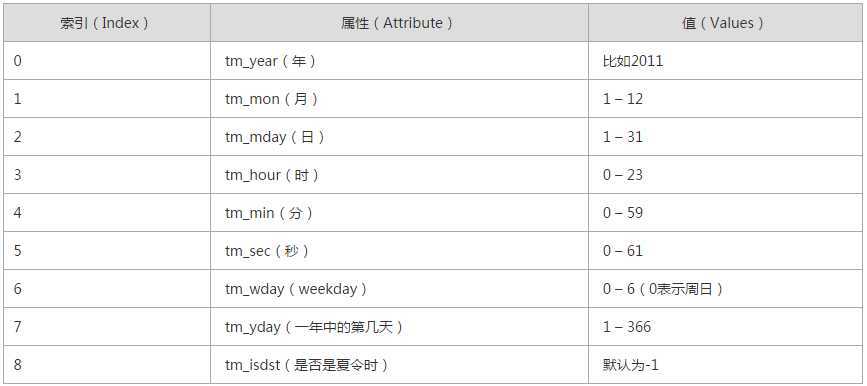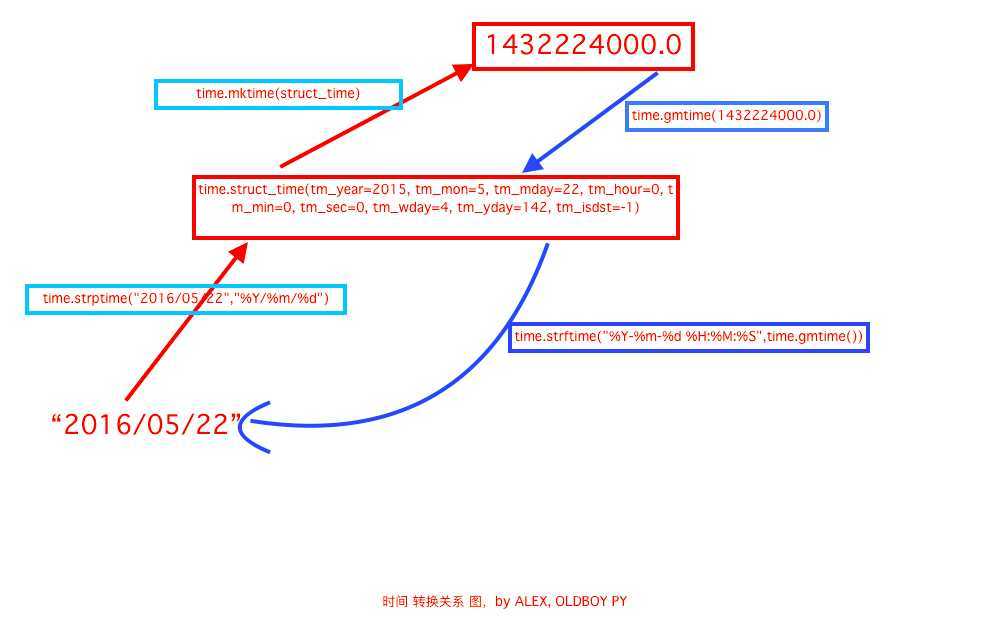标签:覆盖 case logging模块 dos命令 ons test shell命令 section ide
模块,是用一堆代码实现了某个功能的代码集合,n个.py文件组成的代码集合就称为模块。
模块分为三种:
导入模块有以下几种方法:
import module #执行module.py文件的所有代码
import packages #执行packages目录下__init__.py下的代码
from module import test #从module.py文件只导入test方法
from module import test as t #从module.py文件只导入test方法并改名为t
from module import * #从module.py文件导入所有方法,如果有跟它同名的函数会被其覆盖,慎用
导入模块其实就是告诉Python解释器去解释那个py文件
安装模块有以下两种方式:
1,使用系统命令:pip install
2,编译安装源代码包
编译源码 python setup.py build 安装源码 python setup.py install
时间相关的操作,时间有三种表示方式:

1 import time 2 import datetime 3 print(time.gmtime())#返回utc时间的struc时间对象格式 4 print(time.strftime("%Y-%m-%d %H:%M:%S",time.gmtime()))#将utc struct_time格式转成指定的字符串格式 5 #time.sleep(1) 6 print(time.localtime()) 7 print(time.process_time())#测量处理器运算时间 8 print(time.asctime())#返回时间格式如“Sun Apr 1 17:18:24 2018” 9 print(time.ctime())#返回时间格式如“Sun Apr 1 17:18:24 2018” 10 string_2_struct = time.strptime("2018/04/11","%Y/%m/%d")#将日期字符串转成struct时间对象格式 11 print(string_2_struct) 12 13 print(datetime.datetime.now())#返回时间格式 2018-04-01 17:28:23.644249 14 print(datetime.date.fromtimestamp(time.time()))#时间戳直接转成日期格式 2018-04-01 15 print(datetime.datetime.now() + datetime.timedelta(1))#当前时间+1天 16 print(datetime.datetime.now() + datetime.timedelta(-1))#当前时间-1天 17 print(datetime.datetime.now() + datetime.timedelta(hours=1))#当前时间+1小时 18 print(datetime.datetime.now() + datetime.timedelta(minutes=10),‘\n‘)#当前时间+10分 19 c_time = datetime.datetime.now() 20 print(c_time.replace(minute=1,hour=3))#时间替换,把小时改为3,分钟改为1。


随机验证码实例:

1 #!/usr/bin/env python 2 # -*- coding:utf-8 -*- 3 __author__ = ‘lvlibing‘ 4 5 import random 6 checkcode = ‘‘ 7 8 for i in range(6): 9 current = random.randrange(1,6) 10 if current == i: 11 tmp = chr(random.randint(65,90)) 12 else: 13 tmp = random.randint(0,9) 14 checkcode+=str(tmp) 15 16 print(checkcode)
提供对操作系统进行调用的接口
用于提供对解释器相关的操作

1 #!/usr/bin/env python 2 # -*- coding:utf-8 -*- 3 __author__ = ‘lvlibing‘ 4 5 import os 6 import sys 7 8 print(os.getcwd())#获取当前工作目录,即当前python脚本工作的目录路径 9 print(os.curdir)#返回当前目录: ‘.‘ 10 print(os.pardir)#获取当前目录的父目录字符串名:‘..‘ 11 # os.chdir("dirname")#改变当前脚本工作目录 12 os.makedirs(‘J:\\test\\a\\b\\c\\d‘)#可递归生成多层目录 13 os.removedirs(‘J:\\test\\a\\b\\c\\d‘)#若目录为空,则删除,并递归到上一级目录,如若也为空,则删除,依此类推 14 os.mkdir(r‘J:\test\1‘)#生成单级目录 15 os.rmdir(r‘j:\test\1‘)#删除单级空目录,若目录不为空则无法删除 16 print(os.listdir(r‘j:\test‘))#列出指定目录下的所有文件和子目录,包括隐藏文件 17 #os.remove(r‘j:\test\test.txt‘)#删除一个文件 18 #os.rename(‘oldname‘,‘newname‘)#重命名文件/目录 19 print(os.stat(r‘j:\test‘))#获取文件/目录信息 20 print(os.name)#输出字符串指示当前使用平台 21 os.system(‘ipconfig‘) 22 print(os.environ)#获取系统环境变量 23 os.path.abspath(r‘j:\test\test.txt‘)#返回文件的绝对路径 24 os.path.split(r‘j:\test\test.txt‘)#将path分割成目录和文件名二元组返回 25 os.path.dirname(r‘j:\test\test.txt‘)#返回目录名 26 os.path.basename(r‘j:\test\test.txt‘)#返回文件名 27 os.path.exists(r‘j:\test\test.txt‘)#如果存在,返回True;如果不存在,返回False 28 os.path.isfile(r‘j:\test\test.txt‘) 29 print(os.path.isdir(r‘j:\test‘)) 30 print(os.path.getatime(r‘j:\test‘)) 31 print(os.path.getctime(r‘j:\test‘)) 32 print(os.path.getmtime(r‘j:\test‘)) 33 print(os.system(‘dir‘))#运行dos命令,直接显示结果 34 35 print(sys.argv)#命令行参数List,第一个元素是程序本身路径 36 print(sys.exit(n))#退出程序,默认正常退出时exit(0)
提供对文件、文件夹、压缩包处理
shutil.copyfileobj(fsrc, fdst[, length])
将文件内容拷贝到另一个文件中,可以部分内容
shutil.copyfile(src, dst)
拷贝文件
shutil.copymode(src, dst)
仅拷贝权限。内容、组、用户均不变
shutil.copystat(src, dst)
拷贝状态的信息,包括:mode bits, atime, mtime, flags
shutil.copy(src, dst)
拷贝文件和权限
shutil.copy2(src, dst)
拷贝文件和状态信息
shutil.copytree(src, dst, symlinks=False, ignore=None)
递归的去拷贝文件
shutil.rmtree(path[, ignore_errors[, onerror]])
递归的去删除文件
shutil.move(src, dst)
递归的去移动文件
shutil.ignore_patterns(*patterns)
匹配模式到的文件忽略拷贝
用于序列化的两个模块
Json模块提供了四个功能:dumps、dump、loads、load
pickle模块提供了四个功能:dumps、dump、loads、load

1 #!/usr/bin/env python 2 # -*- coding:utf-8 -*- 3 # __Author__ = ‘lvlibing‘ 4 5 import pickle 6 import json 7 8 data = {‘k1‘:‘123‘,‘k2‘:‘hello‘,‘k3‘:‘你好‘} 9 p_str1 = pickle.dumps(data)#将数据通过特殊的形式转换为只有python语言认识的字符串 10 p_str2 = json.dumps(data)#将数据通过特殊的形式转换为所有语言认识的字符串,只支持字符串、列表、字典类型转换 11 print(p_str1) 12 print(p_str2) 13 14 with open(‘data.pickle‘, ‘wb‘) as f: 15 pickle.dump(data,f)#将数据通过特殊的形式转换为只有python语言认识的字符串,并写入文件 16 17 #pickle.load(f)#恢复 18 19 if __name__ == ‘__main__‘:#只在程序本身被使用的时候运行 20 with open(‘data.json‘, ‘w‘) as fp: 21 json.dump(data,fp)#将数据通过特殊的形式转换为所有语言认识的字符串,只支持字符串、列表、字典类型转换,并写入文件 22 23 #json.load(fp)#恢复
shelve 模块
shelve模块是一个简单的k,v将内存数据通过文件持久化的模块,可以持久化任何pickle可支持的python数据格式

1 # -*- coding:utf-8 -*- 2 __author__ = ‘BillyLV‘ 3 4 import shelve 5 import datetime 6 7 d = shelve.open(‘shelve_test‘) # 打开一个文件 8 9 l1 = ["alex", "jack", "test"] 10 d1 = {‘name‘:‘lv‘,‘job‘:‘it‘} 11 d["list"] = l1 # 持久化列表 12 d["dict"] = d1 # 持久化字典 13 d[‘dtime‘] = datetime.datetime.now()#持久化当前时间 14 15 print(d.get(‘list‘))#获取l1列表信息 16 print(d.get(‘dict‘))#获取d1字典信息 17 print(d.get(‘dtime‘)) 18 19 d.close()
xml是实现不同语言或程序之间进行数据交换的协议,xml协议在各个语言里的都是支持的。

1 <data> 2 <country name="Liechtenstein"> 3 <rank updated="yes">2</rank> 4 <year>2008</year> 5 <gdppc>141100</gdppc> 6 <neighbor direction="E" name="Austria" /> 7 <neighbor direction="W" name="Switzerland" /> 8 </country> 9 <country name="Singapore"> 10 <rank updated="yes">5</rank> 11 <year>2011</year> 12 <gdppc>59900</gdppc> 13 <neighbor direction="N" name="Malaysia" /> 14 </country> 15 <country name="Panama"> 16 <rank updated="yes">69</rank> 17 <year updated="yes">2013</year> 18 <gdppc>13600</gdppc> 19 <neighbor direction="W" name="Costa Rica" /> 20 <neighbor direction="E" name="Colombia" /> 21 </country> 22 </data>

1 # -*- coding:utf-8 -*- 2 __author__ = ‘BillyLV‘ 3 4 import xml.etree.ElementTree as ET 5 6 tree = ET.parse(‘xmltest.xml‘) 7 root = tree.getroot() 8 print(root.tag,‘\n‘) 9 10 #遍历xml文档 11 for child in root: 12 print(child.tag,child.attrib) 13 for i in child: 14 print(i.tag,i.text,‘\n‘) 15 16 #只遍历year 节点 17 for node in root.iter(‘year‘): 18 print(node.tag, node.text) 19 20 #修改 21 for sec_node in root.iter(‘year‘): 22 new_year = int(sec_node.text) + 1 23 node.text = str(new_year) 24 node.set(‘updated‘,‘yes‘) 25 26 tree.write(‘xmltest.xml‘) 27 28 #删除 29 for country in root.findall(‘country‘): 30 rank = int(country.find(‘rank‘).text) 31 if rank > 50: 32 root.remove(country) 33 34 tree.write(‘output.xml‘) 35 36 #创建xml文档 37 new_xml = ET.Element(‘namelist‘) 38 name = ET.SubElement(new_xml,‘name‘,attrib={‘encrolled‘:‘no‘}) 39 sex = ET.SubElement(name,‘age‘,attrib={‘checked‘:‘no‘}) 40 sex.text = ‘29‘ 41 name2 = ET.SubElement(new_xml,‘name‘,attrib={‘encrolled‘:‘yes‘}) 42 age = ET.SubElement(name2,‘age‘) 43 age.text = ‘18‘ 44 et = ET.ElementTree(new_xml) 45 et.write(‘test.xml‘,encoding=‘utf-8‘,xml_declaration=True) 46 ET.dump(new_xml)
用于生成和修改常见配置文档

1 import configparser 2 3 config = configparser.ConfigParser() 4 config["DEFAULT"] = {‘ServerAliveInterval‘: ‘45‘, 5 ‘Compression‘: ‘yes‘, 6 ‘CompressionLevel‘: ‘9‘} 7 8 config[‘bitbucket.org‘] = {} 9 config[‘bitbucket.org‘][‘User‘] = ‘hg‘ 10 config[‘topsecret.server.com‘] = {} 11 topsecret = config[‘topsecret.server.com‘] 12 topsecret[‘Host Port‘] = ‘50022‘ # mutates the parser 13 topsecret[‘ForwardX11‘] = ‘no‘ # same here 14 config[‘DEFAULT‘][‘ForwardX11‘] = ‘yes‘ 15 with open(‘example.ini‘, ‘w‘) as configfile: 16 config.write(configfile) 17 config.sections() 18 config.read(‘example.ini‘) 19 config.sections()
hashlib模块
用于加密相关的操作,3.x里代替了md5模块和sha模块,主要提供 SHA1, SHA224, SHA256, SHA384, SHA512 ,MD5 算法
hmac 模块
它内部对我们创建 key 和 内容 再进行处理然后再加密

1 import hashlib,hmac 2 3 hash = hashlib.sha512() 4 hash.update(b‘admin‘) 5 print(hash.hexdigest()) 6 7 m = hashlib.md5(b‘sdfa23ds14‘) 8 m.update(b"Hello") 9 m.update(b"It‘s me") 10 print(m.hexdigest())#16进制格式 11 m.update(b"It‘s been a long time since last time we ...") 12 print(m.digest())#2进制格式 13 14 mac = hmac.new(b‘dqqq33f‘) 15 mac.update(b"Enhanced") 16 print(mac.hexdigest())
用于执行系统命令
可用参数:
terminate() 杀掉所启动进程
communicate() 等待任务结束
用于便捷记录日志且线程安全的模块
logging的日志可以分为 debug < info < warn(warning) < error < critical(fatal)5个级别,只有大于或等于当前日志级别的操作才会被记录。

1 # -*- coding:utf-8 -*- 2 __author__ = ‘BillyLV‘ 3 4 import logging 5 6 logging.warning("user [lv] attempted wrong password more than 3 times") 7 logging.critical("server is down") 8 9 # 高于或等于INFO级别的才会输出 10 logging.basicConfig(filename=‘example.log‘,level=logging.INFO) 11 logging.debug(‘This message should go to the log file‘) 12 logging.info(‘So should this‘) 13 logging.warning(‘And this, too‘) 14 15 # 带时间格式 16 logging.basicConfig(format=‘%(asctime)s %(message)s‘, datefmt=‘%m/%d/%Y %I:%M:%S %p‘) 17 logging.warning(‘is when this event was logged.‘) 18 19 from logging import handlers 20 21 logger = logging.getLogger(__name__) 22 23 log_file = "timelog.log" 24 #fh = handlers.RotatingFileHandler(filename=log_file,maxBytes=10,backupCount=3) 25 fh = handlers.TimedRotatingFileHandler(filename=log_file,when="S",interval=5,backupCount=3) 26 27 formatter = logging.Formatter(‘%(asctime)s %(module)s:%(lineno)d %(message)s‘) 28 29 fh.setFormatter(formatter) 30 31 logger.addHandler(fh) 32 33 logger.warning("test1") 34 logger.warning("test12") 35 logger.warning("test13") 36 logger.warning("test14")
用于对python的正则表达式的操作。
字符:
. 匹配除换行符以外的任意字符
\w 匹配字母或数字或下划线或汉字
\s 匹配任意的空白符
\d 匹配数字
\b 匹配单词的开始或结束
^ 匹配字符串的开始
$ 匹配字符串的结束
次数:
* 重复零次或更多次
+ 重复一次或更多次
? 重复零次或一次
{n} 重复n次
{n,} 重复至少n次
{n,m} 重复n到m次
re.match 从起始位置开始根据模型去字符串中匹配指定内容,匹配单个
re.search 根据模型去字符串中匹配指定内容,匹配单个
re.findall 匹配字符串中所有符合条件的元素
re.splitall 以匹配到的字符当做列表分隔符
re.sub 匹配字符并替换
反斜杠:
匹配一个数字的"\\d"可以写成r"\d"
re.I(re.IGNORECASE): 忽略大小写(括号内是完整写法,下同)
M(MULTILINE): 多行模式,改变‘^‘和‘$‘的行为S(DOTALL): 点任意匹配模式,改变‘.‘的行为# -*- coding:utf-8 -*-
__author__ = ‘BillyLV‘
import re
print(re.findall("ab*","cabb3abcbbac"))
print(re.findall("ab+","ab+cd+abb+bba"))
a = re.search("abc|ABC","ABCBabcCD").group()
print(a)
b = re.search("(abc){2}a(123|456)c", "abcabca123c").group()
print(b)
print(re.search("^al","alexabc"))
#分组匹配
c=re.search("(?P<province>[0-9]{3})(?P<city>[0-9]{3})(?P<birthday>[0-9]{4})","371481199306143242").groupdict("city")
print(c)
参考:
http://www.cnblogs.com/alex3714
http://www.cnblogs.com/wupeiqi
internet&python books
PS:如侵权,联我删。
标签:覆盖 case logging模块 dos命令 ons test shell命令 section ide
原文地址:https://www.cnblogs.com/BillyLV/p/8744225.html